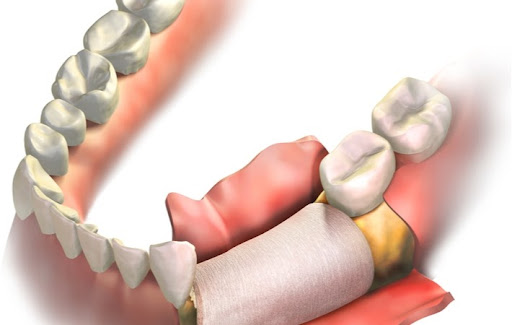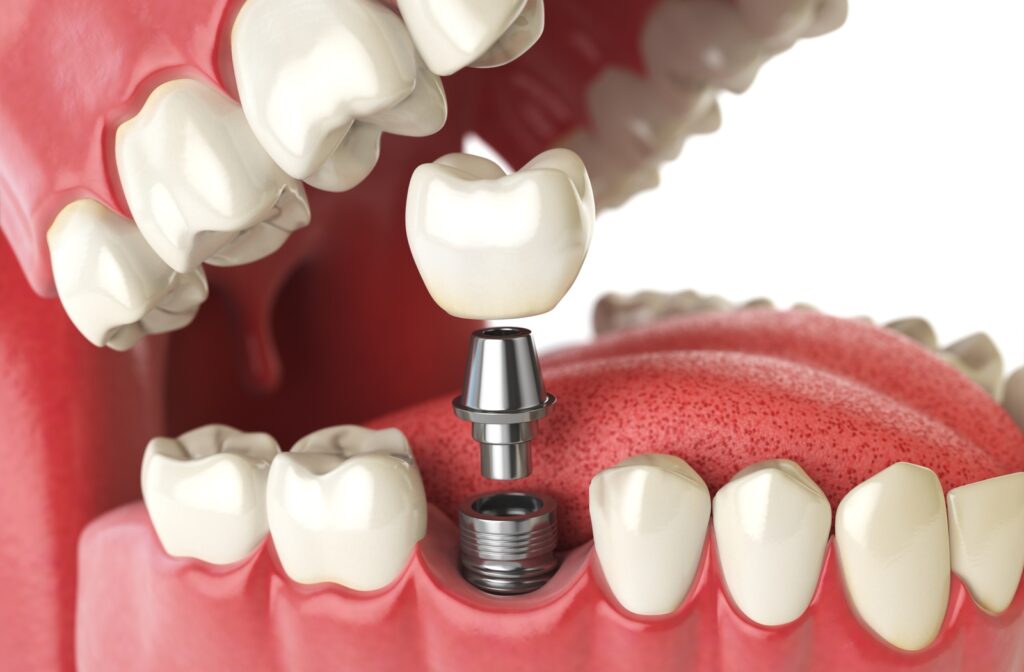Missing teeth can happen due to disease, injury, or a medical condition, but you do not need to lose your smile for good. Dental implants can offer a permanent way to restore your smile. Before you call your dentist, how do you know if you’re eligible for a dental implant?
The dental implant process can take several months to complete, so learn more about the associated risks and your eligibility for this surgery before making any decisions.
What are Dental Implants?
A dental implant is an artificial root implanted into your jaw. These roots hold an artificial tooth in place, looking and functioning like a natural tooth. Since dental implants are surgically placed within the jawbone, they are strong and support your teeth well.
Dental implants can offer many benefits over traditional dentures, including:
- Improved speech
- Improved comfort
- Improved self-esteem
- Easier eating
- Durability
- Improved oral health
- Convenience
With up to a 98% success rate, dental implants can help you feel comfortable with your smile while improving functionality. If you’re hoping to get a dental implant, who can receive one?
Who Can Get a Dental Implant?
According to the Canadian Dental Association, anyone with good health, healthy gums, and enough bone to support an implant can receive one. Implants may not be for everyone; your dentist will evaluate your eligibility for dental surgery.
While many can receive dental implants, you may have complications if you:
- Are a heavy smoker
- Have diabetes or heart disease
- Have gum disease
- Have recently had radiation therapy to the head & neck area
If any of the above applies to you, this does not mean you can’t get a dental implant. All surgery has risks, so your dentist must determine if you can safely receive this operation.
Your dentist will discuss any potential complications with you during your initial dental exam. If anything arises, such as jawbone complications, your dentist will discuss the best course of action for you. For those with jawbone-related issues, you may have to undergo bone grafting before your surgery.

Bone Grafting
Unfortunately, if your jawbone is too soft or not thick enough, you may require additional care before your dental implant. When you chew, there is pressure placed on your jawbone, and if the bone cannot support the implant under pressure, surgery is likely to fail. Bone grafting can help strengthen the area where the implant will go.
Bone grafting can happen with several different materials, including natural bone grafts from another area of your body or synthetic bone grafts. Speak with your doctor to find the best solution.
There is no definite answer for how long you must wait until your jawbone is ready for surgery. Bone grafting may postpone your surgery by several months, or it may happen the same day as your implant surgery. It depends on the condition of your jawbone.
Once your dentist believes you’re ready for surgery, the dental implant process begins. There are several stages to this surgery, alongside many different risks.
Dental Implant Risks
Like any surgery, there are risks involved with dental implants. Even if the probability is low, you should understand how these risks can affect you. Some risks include:
Infection
Infection is a potential risk during your dental surgery. Bacteria cause infections, so you must keep your teeth and the affected area clean.
The common cause of bacterial infections is poor hygiene. This infection can happen from not brushing your teeth enough, leaving behind food debris, not rinsing, or not flossing. You can prevent infection by following your doctor’s instructions diligently.
After surgery, you may not like the idea of putting a toothbrush near the affected area, but you do not need to brush vigorously. Keeping the area clean is vital for proper healing. Your doctor will give you detailed instructions to follow.
Implant Failure
Your dental implants have a chance of rejection after surgery. Complications typically occur due to inflammation around the dental implant called peri-implantitis or the bone failing to grow around the implant.
Peri-implantitis is gum inflammation found around the soft tissue near the dental implant, resulting in deterioration of the bone. A common cause for this condition is poor oral hygiene.
Even false teeth require consistent brushing and flossing. Make sure to follow your dentist’s aftercare instructions thoroughly.
Failure with the jawbone is known as failed osseointegration. This complication occurs when your jawbone does not grow around the implant to keep it secure. Issues may happen due to the quality of your jawbone, smoking, or if you had bone grafting prior.
Nerve damage
During surgery, the implant may be too close to a nerve, causing potentially long-term numbness, tingling or pain. Any nerve damage needs treatment as soon as possible. Symptoms include:
- Persistent numbness on the side of the implant
- Tingling, tickling, or burning sensations in the gums & skin
- Persistent pain or discomfort
These are some of the common risks associated with dental implant surgery. Speaking with your doctor can help you understand all of the potential risks and complications of the procedure.
Speak With Your Doctor
Dental implants can be beneficial but speak with your doctor before making any final decisions. This surgery can be a months-long process, so learning about the details of this procedure can help you determine if it’s something you want to proceed with.
If you’re interested in dental implants, book an appointment with your dental office.




